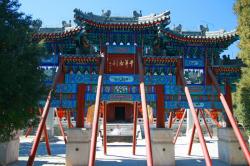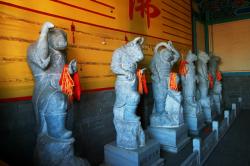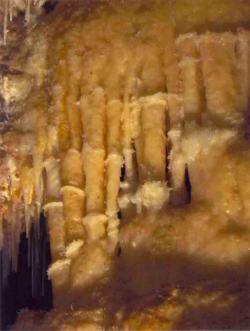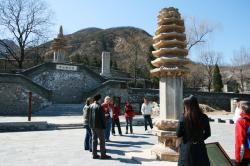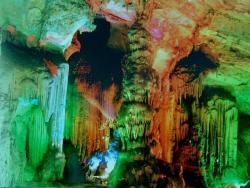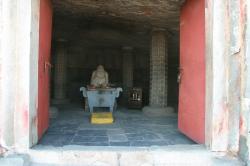Yunju Temple (literally Cloud-dwelling Temple) is a Buddhist shrine and an important heritage site of China in Fangshan, southwest of Beijing.
The temple is famous for three things: its groups of pagodas built in Tang and Liao Dynasties, stone scriptures (Buddhist scriptures inscribed on stone tablets , totally 4,278 integral stone scripture tablets stored in caves), and unearthed Buddha’s flesh sariras (pearl-like Buddha relics) .
The Buddha’s flesh relics in Yunju Temple is one of the three original Buddha’s relics in China, together with finger relics in Famen Temple in Shaanxi and teeth relics in Badachu park of Beijing.
The pagodas at Yunju Temple in Beijing are characterized by long history, large number, special shapes, and exquisite sculptures. Seven of them, dating from Tang Dynasty, are called merits-and-virtues pagodas (The monastery has the largest number of such pagodas in China). Sculptures on them are classics of the art in Tang Dynasty. The north pagoda, dating from Liao Dynasty, is shaped in a way that is rarely found in other ancient pagodas in China. The brick sculptures of Liao-dynasty dances are important for research into dances in that dynasty.
The stone scriptures and the caves for their storage started to be made in the early 6th century, in the years of Daye in Sui Dynasty, by Jingwan, a monk who came from Zhiquan Monastery. In case persecutions of Buddhism by two emperors, namely Taiwu in the northern Wei Dynasty and Wu in the northern Zhou Dynasty, should recur, and also to fulfill the deathbed behest of Master Huisi, his teacher, he decided to carve all scriptures on stone and store them in caves. The work went on for 1,039 years through six dynasties-Sui, Tang, Liao, Jin, Yuan, and Ming, and so far a total of 14,278 well-reserved stone inscriptions were found, 1,122 scriptures in 3,572 volumes.
The practice of inscribing scriptures on stone tablets, the quality of the editions used, the number of scriptures, and the duration of the work are all but unparalleled in China and any other country of the world.
Explore the Yunju (literally Cloud Dwelling) Temple and some beautiful thousand-year old pagodas at the foot of the mountain. View some stored Buddhist scriptures - 14,278 carved stone slabs dating back to over a thousand year.
Then we continue to explore another attraction in Fangshan District - the Silver Fox Cave. You will see the spectacular sights in the 4,500m long karst cave with the unusual formations and stone flowers. A 102 meters long steps will be climbed up (not steep) in the end up to the exit. The temperature in the cave is fixed between 13-14 round the year. Bring a jacket in the summer time (it is cold in the cave in summer), and shoes with friction.
Meet at the China Culture Center, Beijing, China to board the coach.
The temple is famous for three things: its groups of pagodas built in Tang and Liao Dynasties, stone scriptures (Buddhist scriptures inscribed on stone tablets , totally 4,278 integral stone scripture tablets stored in caves), and unearthed Buddha’s flesh sariras (pearl-like Buddha relics) .
The Buddha’s flesh relics in Yunju Temple is one of the three original Buddha’s relics in China, together with finger relics in Famen Temple in Shaanxi and teeth relics in Badachu park of Beijing.
The pagodas at Yunju Temple in Beijing are characterized by long history, large number, special shapes, and exquisite sculptures. Seven of them, dating from Tang Dynasty, are called merits-and-virtues pagodas (The monastery has the largest number of such pagodas in China). Sculptures on them are classics of the art in Tang Dynasty. The north pagoda, dating from Liao Dynasty, is shaped in a way that is rarely found in other ancient pagodas in China. The brick sculptures of Liao-dynasty dances are important for research into dances in that dynasty.
The stone scriptures and the caves for their storage started to be made in the early 6th century, in the years of Daye in Sui Dynasty, by Jingwan, a monk who came from Zhiquan Monastery. In case persecutions of Buddhism by two emperors, namely Taiwu in the northern Wei Dynasty and Wu in the northern Zhou Dynasty, should recur, and also to fulfill the deathbed behest of Master Huisi, his teacher, he decided to carve all scriptures on stone and store them in caves. The work went on for 1,039 years through six dynasties-Sui, Tang, Liao, Jin, Yuan, and Ming, and so far a total of 14,278 well-reserved stone inscriptions were found, 1,122 scriptures in 3,572 volumes.
The practice of inscribing scriptures on stone tablets, the quality of the editions used, the number of scriptures, and the duration of the work are all but unparalleled in China and any other country of the world.
Explore the Yunju (literally Cloud Dwelling) Temple and some beautiful thousand-year old pagodas at the foot of the mountain. View some stored Buddhist scriptures - 14,278 carved stone slabs dating back to over a thousand year.
Then we continue to explore another attraction in Fangshan District - the Silver Fox Cave. You will see the spectacular sights in the 4,500m long karst cave with the unusual formations and stone flowers. A 102 meters long steps will be climbed up (not steep) in the end up to the exit. The temperature in the cave is fixed between 13-14 round the year. Bring a jacket in the summer time (it is cold in the cave in summer), and shoes with friction.
Meet at the China Culture Center, Beijing, China to board the coach.
>> beautiful thousand-year old pagodas at the foot of the mountain and bird-eye view of the area on top of the mountain.
>> secretly stored Buddhist scriptures - 14,278 carved stone slabs dating back to over a thousand year.
>> 4,500m long karsts cave with the unusual formations and stone flowers.
>> secretly stored Buddhist scriptures - 14,278 carved stone slabs dating back to over a thousand year.
>> 4,500m long karsts cave with the unusual formations and stone flowers.
-
CCC does not offer regular set packages for this tour. However we are happy to help you plan a private custom-made one. Please scroll this web page down to check non-negotiable fixed prices and propose a date for your own group. Please note that we do not create a private tour and then make it available for individual people to join. We also do not contact other people to add to a group tour. Similarly, we can create custom-made private tours or activities for you and your family or friends or co-workers at set-prices.
Similar Tours
-
 Tour: Antique Furniture in Rural Beijing
Tour: Antique Furniture in Rural Beijing
-
 Flower Lantern Festival Tour
Flower Lantern Festival Tour
-
 Hiking: Ancient Cave-dwellings Guyaju
Hiking: Ancient Cave-dwellings Guyaju
-
 Day Trip to the Cock Crow Post Town
Day Trip to the Cock Crow Post Town
-
 Light Hiking Tanzhe Monastery & Old Village
Light Hiking Tanzhe Monastery & Old Village
-
 Day-trip: Peking Man Site and Marco Polo Bridge
Day-trip: Peking Man Site and Marco Polo Bridge
-
 Cultural Relics and Rural Life of Fangshan, Beijing
Cultural Relics and Rural Life of Fangshan, Beijing
-
 Mid-Autumn Village Celebration
Mid-Autumn Village Celebration



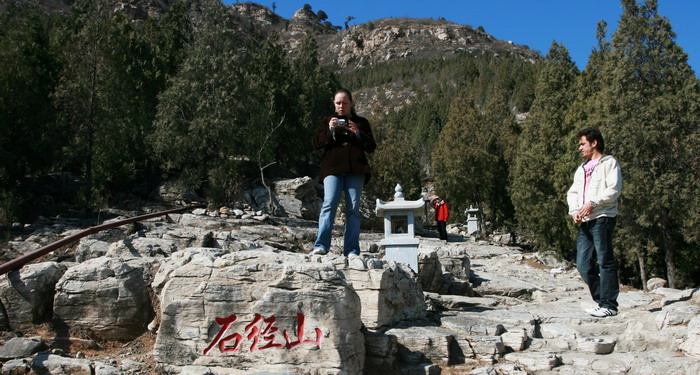
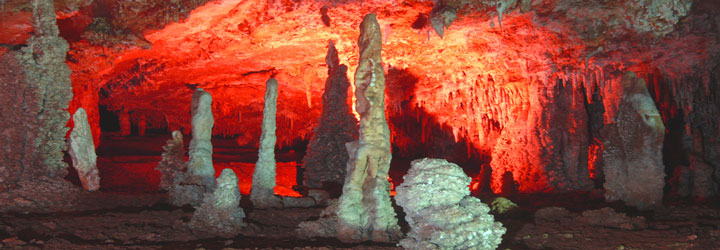
 BOOK IT
BOOK IT ENQUIRY
ENQUIRY